Why inflation is great news for Japan
People and governments around the world are suffering from the effects of soaring inflation. But Japan is rubbing its hands in glee. Merryn Somerset-Webb explains why.

Get the latest financial news, insights and expert analysis from our award-winning MoneyWeek team, to help you understand what really matters when it comes to your finances.
You are now subscribed
Your newsletter sign-up was successful
Want to add more newsletters?

Twice daily
MoneyWeek
Get the latest financial news, insights and expert analysis from our award-winning MoneyWeek team, to help you understand what really matters when it comes to your finances.

Four times a week
Look After My Bills
Sign up to our free money-saving newsletter, filled with the latest news and expert advice to help you find the best tips and deals for managing your bills. Start saving today!
There's not much good about inflation invading pretty much every economy around the world. It's pushing up interest rates everywhere (most recently in Vietnam, where base rates are now 14%) and squeezing consumers from India to the UK. But the worst thing about it from the point of view of governments is that there is nothing they can do about it. This isn't good' inflation caused by rapid domestic growth or high consumer confidence. It is bad' inflation caused, to a large degree, by nasty external shocks in the form of fast rises in fuel and food prices.
But it isn't causing misery everywhere. There is one place that, as Christopher Wood of CLSA puts it, "benefits totally" from the return of inflation: Japan.
So what makes something that is so horrible for the rest of us so great for Japan? The fact that inflation alters expectations. For years now the Japanese, stung by 15 years of on/off recession and deflation, have behaved as though prices can only fall. At both the corporate and the consumer level they've refused to borrow money on the basis that deflation makes the value of your debt rise in real terms and, where possible, they've delayed consumption (why buy something now be it a house or a new dress if you know it will be cheaper in a year's time?).
MoneyWeek
Subscribe to MoneyWeek today and get your first six magazine issues absolutely FREE

Sign up to Money Morning
Don't miss the latest investment and personal finances news, market analysis, plus money-saving tips with our free twice-daily newsletter
Don't miss the latest investment and personal finances news, market analysis, plus money-saving tips with our free twice-daily newsletter
But as rising oil prices and food prices filter into Japan's shops, Japanese expectations have begun to shift. With 58% of restaurants in Tokyo saying they plan to raise prices in this year and Tokyo core CPI up 0.7% in April (the highest inflation rate in ten years), the average Japanese consumer is now saying he thinks inflation will be running at 3.8% in 12 months' time. That's up from 0.9% in April 2007 (see chart bleow).
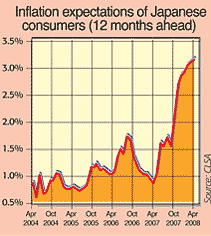
According to the Cabinet Office's confidence survey, more than 86% of people say they expect prices to rise this year, while 31.2% expect them to rise by more than 5%. After 15-odd years of falling prices, that's quite something. It is also extremely good news for firms, who will finally regain some pricing power. When people expect prices to fall they won't put up with price rises from anyone, so for years corporate Japan has continually had to plan around finding ways to cut prices. It is also good for employees, says Wood, in that in Japan workers are traditionally compensated for rising prices. So instead of static or falling wages, Japan's workers may finally find themselves with a few extra yen in their pockets.
Mildly rising inflation expectations like this are also good for consumption. Instead of delaying buying things to beat falling prices, people are likely to bring big purchases forward to beat rising prices, and perhaps use their rising wages to feel confident in doing so. It might also be something that encourages banks to start lending to consumers, who may start borrowing money to buy. Over the last decade there has been much discussion of the Japanese consumer's refusal to borrow, but the banks haven't exactly made it easy for them they have tended to offer loans at punitive interest rates via 'consumer finance subsidiaries' rather than ordinarily-priced consumer loans. This may now start to change a little more rapidly than it has so far.
At the same time, a little inflation might encourage corporate Japan to have a go at enhancing returns by gearing up a bit. Indeed, the numbers suggest this is already happening. As Jonathan Allum of KBC points out, bank lending numbers out this week show the overall rate of loan growth accelerating to 2.1% year on year (see chart).
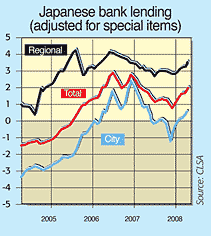
That's well above market expectations and suggests that, "whatever the problems elsewhere in the world, credit is becoming more readily available in Japan". However, the really crucial point about the return of inflation is that Japanese investors are so collectively unprepared for it, says Wood. Institutional investors are still massively overweight in bonds. At the end of February the life assurers had 25.8% of their assets in Japanese Government Bonds (JGBs) and another 9.3% in corporate bonds. In contrast, they had a mere 8.6% of their assets in domestic stocks. Yet inflation makes being invested in bonds look pretty unattractive (rising interest rates mean that bond prices tend to fall).
So at some point the trend will turn, with everyone starting to pile out of bonds and into equities. When this happens, says Wood, the effect will be huge: "remember, this is the ultimate group society so inflection points are massive". And this inflection point isn't just about institutions, it's about ordinary savers too. Unlike their shopping-crazed Western counterparts, the Japanese have huge levels of savings, a massive amount of which just over 50% at the moment they hold in cash and bank deposits on which they earn practically no interest. They didn't much mind that during the dark days of deflation (even with no interest at all, you maintain your purchasing power when prices are falling).
But now, if these savers see inflation coming and want to preserve the real value of their savings, they're going to have to move some of their money out of cash and into the stockmarket. And it looks like they know it. Interestingly, says Wood, the domestic investment trust industry has recently started to market a few domestic Japanese equity funds with some success. Launches have included the Nikko Japan High Dividend Stock Fund and the Nomura Japan Value High Dividend Fund. A total of around $1bn has been raised so far. It all bodes well.
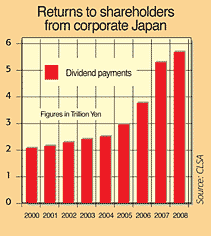
But while the return of inflation might be a good catalyst for a move in the Japanese market, it isn't the only reason to get in. Also of note is the fact that the economy as a whole is in good shape. First-quarter growth has just been revised upwards from 0.8% to 1%, and Capital Economics says it is entirely comfortable with its existing forecast of 3% growth this year, with any risk to this number looking "increasingly on the upside". Imagine how happy Gordon Brown would be to hear anyone say anything like that about the British economy.
Overall, says Capital, it looks almost certain that GDP growth for the full year will come in at, or above, 1.5%, marking the sixth year in a row that this has been the case. This in turn should maintain some of the upward pressure on inflation and interest rates. Indeed, interest rates rising should be considered a good, not a bad thing, in that such a move would knock any remaining deflationary mindsets on the head, while marking the beginning of the normalisation of Japanese monetary policy.
But just as important as all this is that Japan is cheap. Of all the global markets, says Teun Draaisma of Morgan Stanley, it is the closest to a "classical bear market trough". The market p/e is well below the long-term historical average; the market price-to-book-value ratio is the lowest of all the major regions at around 1.5 times (compared to two times in the US); while many stocks trade well below their book values.
At the same time, dividends have been rising in the last few years. Japanese firms have long been famously mean when it comes to paying out profits to shareholders, but in the last four years the payout ratio has risen from 19% to more like 27%, so the market as a whole now yields 1.6% (back in the early 1990s, it yielded only 0.4%).
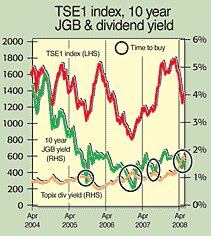
This brings me to one final point we've looked at this before, but it bears repeating. The chart to the left shows the ten-year JGB yield relative to the dividend yield on the Topix index. In the past, every occasion of their crossing (ie, when the dividend yield is higher than the bond yield) has marked the start of a major market rally. And so it seems this time: the Topix is already up 21% from its lows in March.
Good ways to get into Japan
Getting into the Japanese market is remarkably straightforward. The simplest and cheapest way is to buy an exchange-traded fund (ETF), such as the iShares MSCI Japan Index Fund (LON:IJPN), which holds 350 Japanese stocks and gives you pretty broad exposure to all market sectors.
Otherwise, the investment trust sector is currently interesting mainly because most of the Japan-related trusts trade on hefty discounts to their net worth an average of 10.6%, says Nina Montagu Smith in The Daily Telegraph. So which ones to buy? Montagu-Smith suggests the Baillie Gifford Japan Trust, the Perpetual Japanese Trust, or the Morant Wright Japan Income Trust. The latter has risen by 28% since the market's March low, but still trades on a discount to its net assets of well over 7%.
In the unit trust sector, Montagu Smith points to Fidelity Japan, Legg Mason Japan and Jupiter Japan Income, but like most unit trusts they come with initial charges and high annual fees, so I suspect most of us would be better off with the investment trusts, particularly given that if the market does continue to rise convincingly, their discounts are likely to close fast.
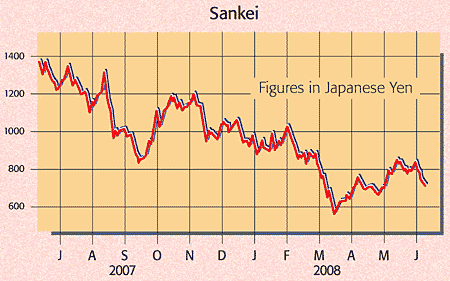
If you are looking to hold individual stocks, the best place to be, says CLSA's Christopher Wood, is in the Japanese megabank stocks and big trading firms. The banks look good for the simple reason that they are not exposed to the unwinding of the Western financial system in the same way as British and American banks are. They have very little exposure to subprime borrowings and, thanks to the legacy of their own solvency issues during the 1990s, they've barely lent anyone a penny for the last decade, let alone anyone remotely risky.
The banks performed horribly in the early part of this year, but there is really no reason for them to continue to move in sympathy with our own wretched financial institutions. Les Jones of the Old Mutual Japanese Select Fund agrees, pointing out that not only have any losses resulting from the global turmoil of the last year been "minimal", but that the banks are now in "a position to increase their loan portfolios considerably".
The trading companies are interesting for another reason. They are, says Wood, "the best way of playing the commodity/emerging market theme in a dedicated Japanese equity portfolio." They are also looking pretty cheap. Mitsubishi and Marubeni, both huge trading companies with fingers in hundreds of pies, trade at ten times this year's consensus forecast earnings, while the two other big ones Sumitomo and Mitsui are on eight and nine times respectively.
CLSA also like the look of Fanuc, a robotics company with headquarters just at the foot of Mount Fuji (see www.fanuc.co.jp for some wonderful pictures of this), on the basis that Japan's labour shortage means that the demand for robotics can only rise from here.
Finally, a tip from MoneyWeek regular James Ferguson of Pali International. His "number one" stock for the next 12 months is, he says, Sankei Building (8809 JP), a construction company and building operator very active in Tokyo its main asset is the vast Tokyo Sankei Building in the popular Marunouchi district, just opposite Tokyo's main railway station. The shares currently trade on a p/e for 2008 of around 15 times and yield just below 2%, having fallen back hugely from their highs last year, along with prices in the central Tokyo real estate market.
This doesn't make them look expensive, but Pali consider the best way to value real-estate stocks is to look at their net asset value relative to their stock price, and on this basis Sankei looks very cheap indeed. The current share price is around 700, but according to Pali the large number of new projects the firm is involved in should lift its net asset value to 1,350 a share in the next few months, "turning a significant discount to net asset value into a substantial one".
Get the latest financial news, insights and expert analysis from our award-winning MoneyWeek team, to help you understand what really matters when it comes to your finances.

-
 Can mining stocks deliver golden gains?
Can mining stocks deliver golden gains?With gold and silver prices having outperformed the stock markets last year, mining stocks can be an effective, if volatile, means of gaining exposure
-
 8 ways the ‘sandwich generation’ can protect wealth
8 ways the ‘sandwich generation’ can protect wealthPeople squeezed between caring for ageing parents and adult children or younger grandchildren – known as the ‘sandwich generation’ – are at risk of neglecting their own financial planning. Here’s how to protect yourself and your loved ones’ wealth.